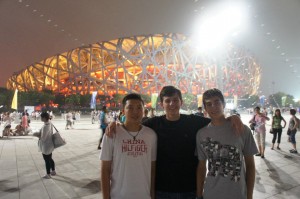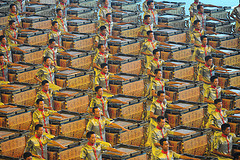By Tyler Knauss, M. Baker and Cat McNeela

By Tyler Knauss, licensed with CC 2.0
Inside the city of Beijing, the Olympic facilities sit relatively unused since the end of the Games in 2008. Placed strategically in the center of the city, they are now only a place for tourists. For how grand these facilities are, as well as the fact that they are not used and have been largely dormant, it could be argued that these facilities were and are a wasted use of labor and capital for the people of China. Much can be said about whether or not it was the correct move of the world to have allowed the Olympics to be hosted in China. “The Olympics marked the beginning, it can be said, of the ascendance of the stability preservation regime in China. Looking back now, it might be that the Olympics were something [China] did that [it] ought not to have done.”
The Chinese government has used the success of the Olympics, and its ability to gather large pools of capital and resources, to assert itself over its people. Because of the spending power the government has, they are able to exert themselves greatly over the citizens of China and rule over them in a tightly controlled environment. “And he who has wealth speaks loudest,” muses Sun Liping, professor of Sociology at Tsinghua University.
With the Chinese government having so much power, coupled with the fact that it is still a one-party system, there is no room for compromise within the system. It can be said that the Olympics in 2008 were just another factor in strengthening the authority and overall ability of the government to increase their power in China. Because of the success of the 2008 Olympics, the government gained a lot of prestige for China as a whole. This prestige and success of the Olympics allowed the government to receive huge praise for the planning and execution of the games. However, the games brought on great duress to the poorer residents of Beijing. Many people there live in squalor and the funding that went towards the games could have been used to help these residents on a slightly smaller scale, but just as successfully as the Olympics. For the billions spent, the political environment brought on by the Olympics gave no cause to the government to put that money in the hands of the poor, but instead used it to support their own interests in bringing about an impressive display for the whole world to watch.

https://creativecommons.org/licenses/by/2.0/
www.armymwr.com
https://www.flickr.com/photos/familymwr/4927868989/in/photostream/
See Also:
Before and After the Beijing Olympics: Economic Change
Before and After the Beijing Olympics: Physical Change
Sources
Adam, Taylor. Business Insider, “The Beijing Olympics Were a Mistake.” Last modified March 27, 2013. Accessed March 5, 2014. http://www.businessinsider.com/the-beijing-olympics-were-a-mistake-2013-3.
Feng Huiling, The Humanistic Values of the Beijing Olympics, (Singapore: Enrich Professional Publishing, 2011), 1 -334.
Yong Zhou and John Ap, “Residents’ Perceptions Towards the Impact of the 2008 Olympic Games,” Journal of Travel Research 48, no. 1 (2009): 78-91.
